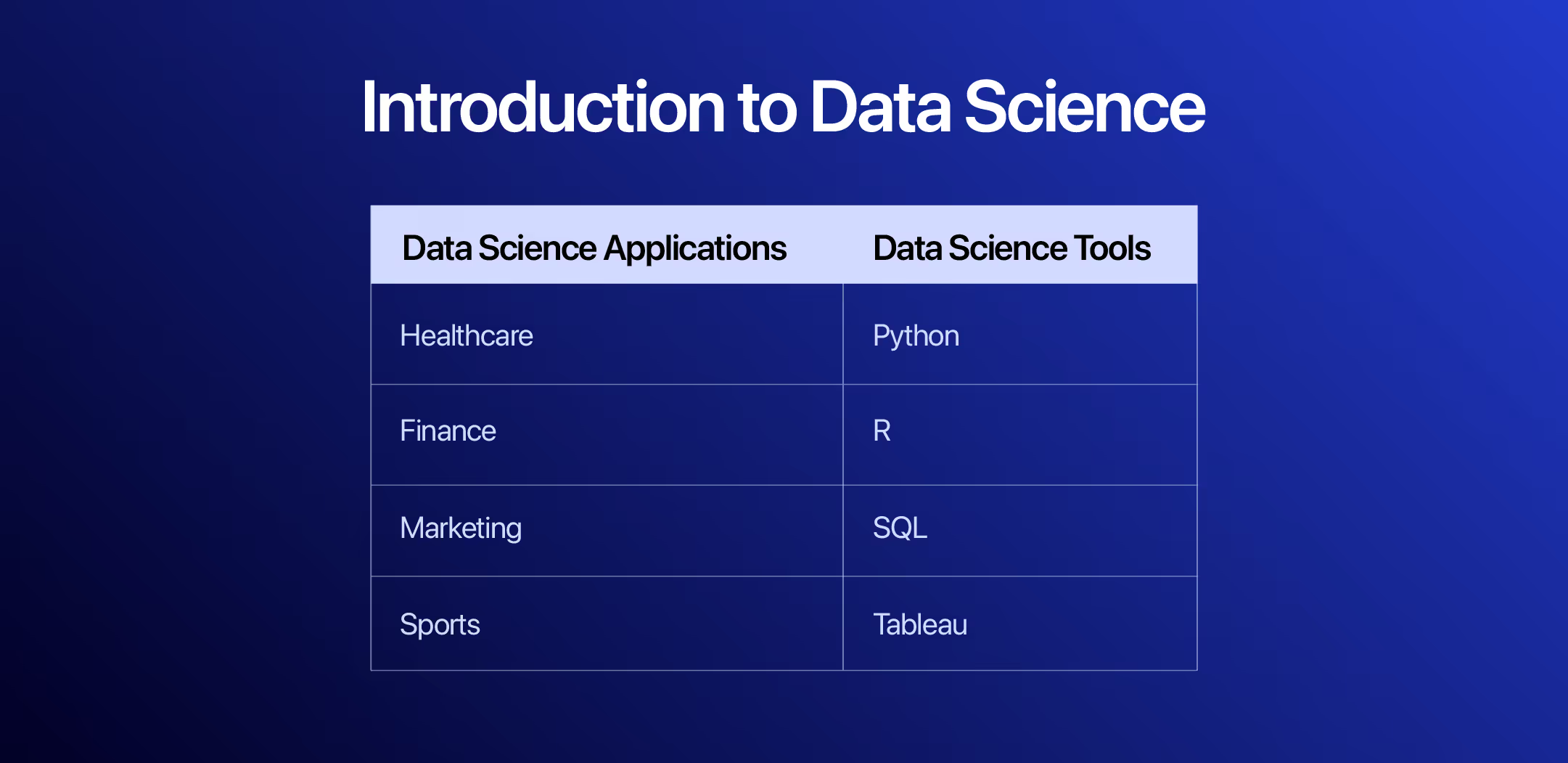In the digital age, data is everywhere — from your mobile usage and social media activity to supply chains and medical records. But raw data alone doesn’t mean much unless it's analyzed and transformed into valuable insights. This is exactly what Post Graduation does. It is the backbone of modern decision-making in business, healthcare, government, and technology.
In this in-depth guide, we’ll explore what data science is, how it works, its core components, real-world applications, tools, skills needed, and career opportunities.
What Is Data Science?

Data science is an interdisciplinary field focused on extracting knowledge and insights from structured and unstructured data using scientific methods, algorithms, processes, and systems.
It blends several disciplines including:
- Mathematics and statistics
- Computer science
- Machine learning and artificial intelligence
- Domain-specific knowledge
- Data visualization and communication
Unlike traditional data analysis, data science is not just about reporting past events; it’s about predicting future outcomes, automating processes, and guiding strategic decisions based on data.
Core Components of Data Science
Data Collection
The data science process starts with collecting data from various sources. These sources can include:
- Databases and data warehouses
- APIs and web scraping tools
- IoT sensors and devices
- Transaction logs and CRM systems
- Surveys and user-generated content
Data Cleaning and Preparation
Raw data is often messy. It may contain missing values, errors, duplicate records, or inconsistent formats. Data cleaning is one of the most time-consuming but essential steps, involving:
- Removing duplicates
- Filling or dropping missing values
- Normalizing and standardizing data
- Encoding categorical variables
- Formatting dates and times
Exploratory Data Analysis (EDA)
EDA involves summarizing the main characteristics of the data, often with visual methods. This step helps data scientists understand the underlying structure of the data and uncover hidden patterns.
- Summary statistics (mean, median, variance)
- Correlation analysis
- Histograms, scatterplots, and boxplots
- Outlier detection
Modeling and Machine Learning
This is where algorithms come into play. Based on the business or research problem, data scientists choose appropriate models to make predictions or identify patterns.
Types of machine learning used:
- Supervised learning (e.g., linear regression, decision trees)
- Unsupervised learning (e.g., clustering, PCA)
- Reinforcement learning (e.g., game AI, robotics)
- Deep learning (e.g., image and speech recognition)
Evaluation
Models are evaluated based on performance metrics like:
- Accuracy
- Precision and recall
- F1 score
- Mean squared error (MSE)
- ROC-AUC curve
Evaluation ensures that the model performs well not only on the training data but also on unseen data.
Data Visualization and Communication
Insights are only as valuable as they are understandable. Data scientists use visualization tools to present their findings clearly and effectively.
Common visualization tools:
- Matplotlib and Seaborn (Python)
- Tableau and Power BI
- Plotly
- D3.js (JavaScript)
Applications of Data Science
Business and Marketing
- Customer segmentation
- Sales forecasting
- Product recommendation systems
- Ad targeting and campaign optimization
Healthcare
- Disease prediction and diagnosis
- Medical image analysis
- Drug discovery
- Patient risk assessment
Finance
- Credit scoring
- Fraud detection
- Algorithmic trading
- Portfolio management
Transportation and Logistics
- Route optimization
- Demand forecasting
- Autonomous vehicle algorithms
- Fleet management
Social Media and Content Platforms
- Personalized content recommendations
- Sentiment analysis
- Spam detection
- User engagement prediction
Government and Public Policy
- Census data analysis
- Crime pattern prediction
- Resource allocation
- Public health monitoring
Data Science vs Related Fields
Data Science vs Data Analytics
- Data analytics focuses on analyzing historical data and reporting trends.
- Data science is broader and includes predictive modeling and automation.
Data Science vs Machine Learning
- Machine learning is a subset of data science focused on building models that learn from data.
- Data science includes all stages from data collection to communication of insights.
Data Science vs Artificial Intelligence
- AI is about creating intelligent systems that can perform tasks like humans.
- Data science helps train these systems using large datasets.
Tools and Technologies in Data Science
Programming Languages
- Python: Most widely used due to its simplicity and rich libraries (NumPy, Pandas, Scikit-learn).
- R: Preferred in academia and for statistical analysis.
- SQL: Essential for working with relational databases.
- Java and Scala: Used in big data environments like Apache Spark.
Libraries and Frameworks
- Pandas, NumPy: Data manipulation
- Scikit-learn: Machine learning
- TensorFlow, PyTorch: Deep learning
- Matplotlib, Seaborn, Plotly: Data visualization
Big Data Tools
- Apache Hadoop
- Apache Spark
- Kafka
- Hive and Pig
Cloud Platforms
- AWS (Amazon Web Services)
- Google Cloud Platform (GCP)
- Microsoft Azure
Skills Required to Become a Data Scientist
Technical Skills
- Strong foundation in statistics and probability
- Proficiency in Python or R
- Understanding of machine learning algorithms
- Working knowledge of SQL and databases
- Ability to use data visualization tools
Soft Skills
- Problem-solving mindset
- Business acumen
- Communication and storytelling
- Curiosity and continuous learning
Career Opportunities in Data Science
Demand for data scientists has exploded across industries. According to job portals and market surveys, data science roles are among the highest-paying and fastest-growing worldwide.
Common Job Roles
- Data Scientist
- Machine Learning Engineer
- Data Analyst
- Data Engineer
- AI/ML Researcher
- Business Intelligence Analyst
Industries Hiring Data Scientists
- Tech and Software (e.g., Google, Amazon, Microsoft)
- Finance and Insurance (e.g., JPMorgan Chase, Goldman Sachs)
- Healthcare (e.g., Pfizer, Mayo Clinic)
- Retail and E-commerce (e.g., Walmart, Flipkart)
- Government and NGOs
How to Become a Data Scientist
Academic Path
- Pursue a degree in Computer Science, Statistics, Mathematics, or Data Science
- Enroll in online courses or bootcamps (Coursera, Udemy, edX, DataCamp)
Build a Portfolio
- Participate in Kaggle competitions
- Work on real-world projects (e.g., sales prediction, sentiment analysis)
- Share work on GitHub
Get Certified
Consider certifications such as:
- IBM Data Science Professional Certificate
- Google Data Analytics Certificate
- Microsoft Certified: Azure Data Scientist Associate
Gain Experience
- Apply for internships
- Contribute to open-source projects
- Network with professionals on platforms like LinkedIn
Future of Data Science
Data science is evolving rapidly. Some emerging trends include:
- AutoML: Automating machine learning workflows
- MLOps: Operationalizing models at scale
- Explainable AI (XAI): Making AI decisions more transparent
- Edge AI: Running models directly on devices
- Synthetic data: Generating artificial data for model training
As industries increasingly rely on data to make decisions, the demand for skilled professionals will continue to grow.
Final Thoughts
Data science is not just a career—it's a powerful toolkit for solving real-world problems across every sector imaginable. It requires a blend of curiosity, analytical skills, and technical knowledge, but the rewards—intellectual, professional, and financial—are significant.
If you're intrigued by the idea of turning raw data into real insights, building models that predict the future, or helping organizations become data-driven, then a path in data science could be the perfect fit for you.
FAQ: Data Science
What is data science?
Data science combines scientific methods, algorithms, statistics, and domain knowledge to extract insights, patterns, and predictions from structured and unstructured data.
What skills are required for data science?
Key skills include programming (Python, R), statistics & probability, machine learning, data wrangling & cleaning, data visualization, domain expertise, and communication.
How is data science different from machine learning or AI?
Data science has a broader scope: it includes collecting, cleaning, exploring data, building models, and interpreting results. Machine learning and AI are subsets focused on algorithms and model building.
What is the data science process / lifecycle?
Steps: data collection → data cleaning / preprocessing → exploratory analysis → feature engineering → model building → evaluation → deployment & monitoring.
What are real-world applications of data science?
Examples: predictive analytics (sales forecasting, risk modeling), recommendation systems (Netflix, Amazon), customer segmentation, fraud detection, healthcare analytics, NLP, image analytics.
How can I start a career in data science?
Start with foundational courses in statistics, programming, and machine learning. Build projects (Kaggle etc.), learn tools (pandas, scikit-learn, TensorFlow), and showcase through a portfolio or GitHub.








.avif)
.avif)
